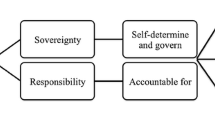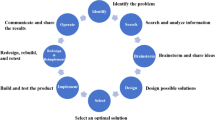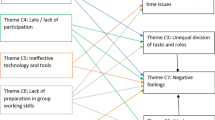Abstract
This paper presents perceptions and attitudes of freshmen students that have participated in an introductory Project-Based Learning (PBL) course in engineering. The course, `A creative introduction to mechanical engineering', was developed and is taught in the Faculty of Mechanical Engineering at the Technion. In this course, teams of students carry out mini-projects that require the design and construction of devices that perform pre-defined tasks. The qualitative paradigm was found to be suitable for studying the process undergone by the students, mainly because the study focused on the human aspect — the students' emotions, thoughts, behavior, and difficulties. Data was collected by means of semi-structured interviews with the students, the teacher, and the teaching-assistant, by observations in the classroom, and by analyzing students' reports. The paper presents the students' perceptions of: the aim of the course; the instructor's role in a PBL environment; characteristics of PBL course; advantages of the PBL from the students' point of view; PBL as a learning environment for future engineers, and implications of learning in teams.
Similar content being viewed by others
REFERENCES
Barak, M.: 2002, ‘Learning Good Electronics or Coping with Challenging Tasks: The Priorities of Excellent Students', Journal of Technology Education 14(1), 20–34.
Barak, M. & Goffer, N.: 2002, ‘Fostering Systematic Innovative Thinking and Problem Solving: Lessons Education Can Learn From Industry', International Journal of Technology and Design Education 12(3), 227–247.
Cobern, W.: 1993, ‘Contextual Constructivism: The Impact of Culture on the Learning and Teaching of Science', in K. G. Tobin (ed.), The Practice of Constructivism in Science Education, Lawrence Erlbaum Associates, Hillsdale, NJ.
Denzin, N. & Lincoln Y.: 1994, ‘Entering the Field of Qualitative Research', in N. Denzin & Y. Lincoln (eds.), Handbook of Qualitative Research, Sage, Thousand Oaks, CA.
Elata, D. & Garaway, I.: 2002, ‘A Creative Introduction to Mechanical Engineering’, Int. J. of Eng. Education 18(5).
Fosnot, C. T.: 1996, ‘Constructivism: A Psychological theory of Learning', in C. T. Fosnot (ed.), Constructivism: Theory, Perspective and Practice, Teacher College, Columbia University, New York.
Frank, M.: 1999, Engineering Systems Thinking-Characteristics and Learning Processes, unpublished Ph.D. thesis, Department of Education in Technology and Science, Technion-Israel Institute of Technology (In Hebrew, abstract in English), Haifa, Israel.
Fullan, M.: 2001, Leading in a Culture of Change, Wiley, New York.
Fullan, M.: 1997, ‘The Complexity of the Process', in M. Fullan (ed.), The Challenge of School Change: A Collection of Articles, Skylight Training and Publishing, Arlington, IL.
Glasersfeld, E. V.: 1995, ‘A constructivist Approach to Teaching’ in P. Leslie & J. Gale (eds.), Constructivism in Education, Hillsdale, New Jersey.
Goodlad, J.: 1987, The Ecology of School Renewal, University of Chicago Press, Chicago.
Green, A. M.: ‘Project-Based-Learning: Moving Students Toward Meaningful Learning', ERIC Database, ED422466.
Haury, D. L.: 1993, Teaching Science through Inquiry, ERIC Digest.
Hill, A. M.: 1999, ‘Community-Based Projects in Technology Education: An Approach for Relevant Learning', in W. E. Theuerkauf & M. J. Dyrenfurth (eds.), International Perspectives on Technological Education: Outcomes and Futures, Ames, Braunschweig, Germany.
Hill A. M.: 1998, ‘Problem Solving in Real-Life Contexts: Alternatives for Design in Technology Education', International Journal of Technology and Design Education 8(3), 203–220.
Hill, A. M.: 1997, ‘Reconstructionism in Technology Education', International Journal of Technology and Design Education 7(1–2), 121–139.
Hill, A. M. & Hopkins, D.: 1999, ‘University/school Collaboration in Teacher Education', in M. Lang, J. Olson, H. Hansen & W. Bunde (eds.), Changing Schools/Changing Practices: Perspectives on Educational Reform and Teacher Professionalism, Garant, Louvain, France, 171–182.
Hill, A. M. & Smith, H. A.: 1998, ‘Practices Meets Theory in Technological Education: A Case of Authentic Learning in the High School Setting', Journal of Technology Education 9(1), 29–41.
Jewell, L. N. & Reitz, H. J.: 1984, Group Effectiveness in Organization, Warner Books, New York.
Krajcik, J., Czerniak, C. & Berger, C.: 1999, Teaching Science: A Project-Based Approach, McGraw-Hill College, New York.
Larson, E.C. & La Fasto, F.: 1989, Team Work. McGraw-Hill, New York.
Orevi, N. & Dannon, R.: 1999, ‘Learning Ecology with Educational Technologies', paper presented at the International Workshop on Science Teachers Education toward the New Millenium, Technion-Department of Education in Technology and Science, January 5–6, Haifa, Israel.
Rosenfeld, M. & Rosenfeld, S.: 1999, ‘Understanding the Surprise in PBL: An Exploration into the Learning Styles of Teachers and Their Students', paper presented at the 8th Conference of EARLI (European Association for Research in Learning and Instruction), Goteburg, Sweden.
Senge, P. M.: 1994, The Fifth Discipline: The Art and Practice of the Learning Organization, Doubleday, New York.
Sergiovanni, T. J.: 1990, Value-Added Leadership: How to get Extraordinary Performance in School, Harcourt Brace, Inc., New York.
Shepherd, H. G.: 1998, ‘The Probe Method: A Project-Based-Learning Model's Effect on Critical Thinking Skills', Dissertation Abstracts International, Section A 59(3A), 779.
Tamir, P.: 1990, ‘Considering the Role of Invitations to Inquiry in Science Teaching and in Teacher Education', Journal of Science Teacher Education 1(3), 41–45.
Thomas, J. W., A Review of Research on Project-Based-Learning. Available at: http://www.autodesk.com/foundation/pbl/research.
Turnball, W.: 2002, ‘The Place of Authenticity in Technology in The New Zealand Curriculum', International Journal of Technology and Design Education 12(1), 23–40.
Vygotsky, L. S.: 1986, Thought and Language. Translated by A. Kozulin, MIT Press, Cambridge, Mass. (Original English translation published 1962.)
Author information
Authors and Affiliations
Rights and permissions
About this article
Cite this article
Frank, M., Lavy, I. & Elata, D. Implementing the Project-Based Learning Approach in an Academic Engineering Course. International Journal of Technology and Design Education 13, 273–288 (2003). https://doi.org/10.1023/A:1026192113732
Issue Date:
DOI: https://doi.org/10.1023/A:1026192113732




